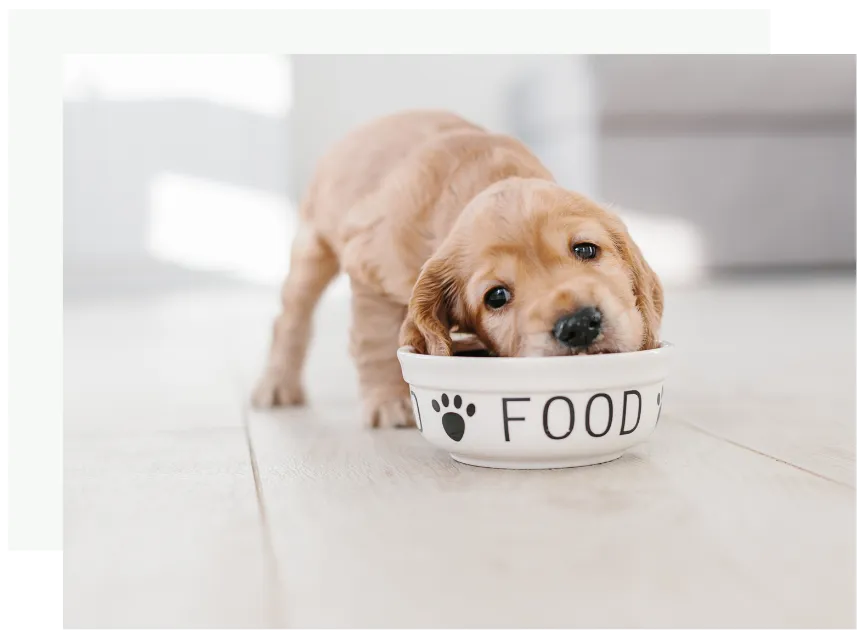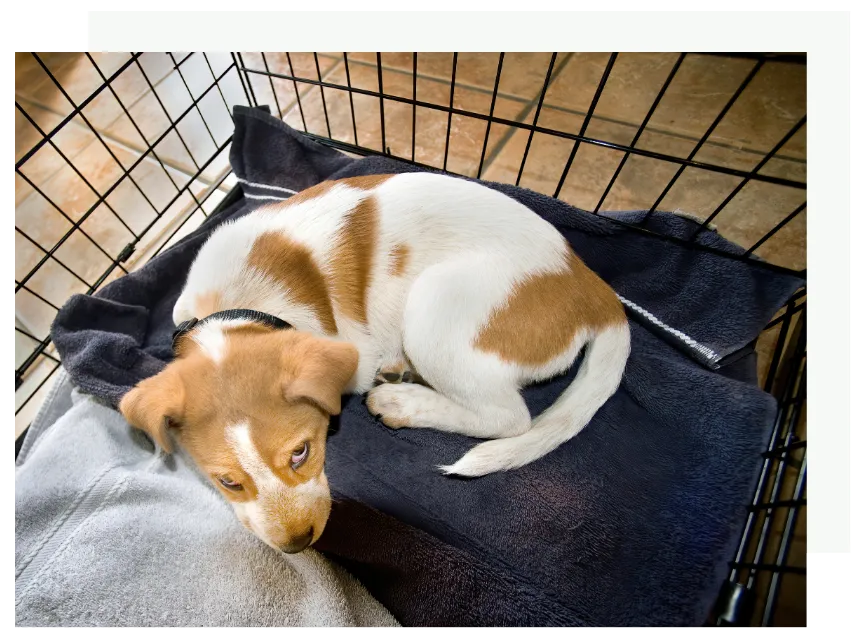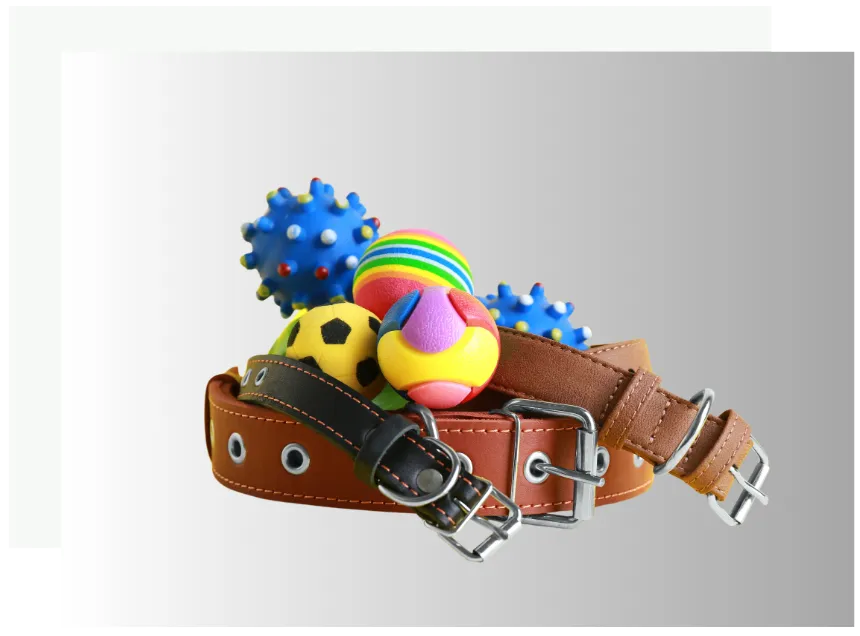Located in Bellevue, serving Seattle Metro, the Eastside Communities and King County
Before your Puppy Comes Home
Going to a new home is stressful for your puppy. Set up your home ahead of time so you can make the transition as smooth as possible and really enjoy your new bundle of love. Make your home a safe, welcoming environment for little Fido to come home to.
The Essentials
The items below are the essentials that you'll need to have before puppy comes home. Don't wait until you get them and then go to the store. Your puppies first day will be quite overwhelming as it is, you don't want to make extra stops and stress your puppy with too many new things.

Food & Bowls
What to feed your new puppy can be a confusing topic for new puppy owners. If you're getting your pup from a breeder, it's best to continue with what they've been feeding for the transition period. If you decide to make some changes later, do it gradually. An abrupt change in their diet along with the stress of going to a new home may cause some digestive isues.
Choose food and water bowls wisely, many cute pet bowls contain harmful chemicals that can leach into your dog's food and water. Not Good! High quality stainless steel, heavy glass or a good quality ceramic is best.
Crates, Gates & Pens
This is such an important topic that we have an entire page dedicated to it - click here.
Crate training is a must, for several reasons! Your puppy needs a safe bedroom where they can sleep and decompress. It's also essential for potty training! Your choice of a crate will depend on several factors, so click here for help choosing a crate and setting it up as a positive place for your new puppy to relax. Make sure it's ready for when your puppy arrives!!
A puppy pen and baby gates may also be handuy to manage your pup's access to some areas of your home. don't make the rather huge mistake of giving puppy free roam of the house too soon!

Don't waste money on expensive bedding right now. Your puppy will likely chew up a stuffed bed. chooses somethiing absorbent in case of accidents, an old towel or a flannel blanket is fine. Click here for more information aabout puppy friendly bedding options.

King County requires dogs to be licensed, although some areas, such as Renton, have their own licensing. Check here to learn more about pet licensing. Always have their license attached to their collar.
Collars and Leashes
Collars should be adjustable and fitted so that it won't easily slip off and your puppy can't get their paw or jaw stuck in it. Take the collar off when they're in the crate or pen when your puppy is home alone. Attach ID tags with your puppies name, address and phone number.
To start with, a 4-6 foot leash is best. In addition to your regular leash, you'll need a light weight 6' nylon leash with the handle cut off for your pup to wear in the house so you can easliy manage and direct them when they get into mischief. Eventually you will need other types of leashes for training, but this will do for now.
Toys, Toys, Toys!
Toys fall into two basic categories:
1 - Pacifier Toys
2 - Interactive Toys
Pacifier toys are things like Kongs, food dispensing toys, and chew toys that can be given to the pup in their crate or pen. These toys must be carefully chosen with regards to safety! Be sure the toy is large enough that the pup can't choke on it or swallow it. Avoid rawhides or other highly processed chewies.
Interactive toys are the ones you'll use when playing and training with your puppy. Stuffed toys and squeeky toys or anything else that the pup may chew up and ingest should be reserved for times when you're directly interacting with your puppy.


SUPER IMPORTANT!!! Start early (like right now) getting your puppy used to simple grooming procedures and being comfortable with being handled. Especially ears, paws and rolling over on their back.
Other Stuff
Treat bag - We recommend two types, one smaller bag without extraneous pockets for in the house and another with space to carry treats, but also poop bags, keys, phone, water and other items for walks and outings.
Poop bags - Don't leave home without 'em! Word to the wise, don't get thin, flimsy bags - or you'll be sorry! ;)
Grooming Tools - Your grooming needs will depend entirely on your dog's breed and/or coat and their activities. At least have a no tears puppy shampoo, a brush and nail trimmers. Check out our Favorite Things page for suggestions.
A puppy pen and baby gates may also be handuy to manage your pup's access to some areas of your home. don't make the rather huge mistale of giving puppy free roam of the house too soon!
Potty Systems -It's my belief that paper potty pads often hinder training efforts in the long term. If your living situation is such that you're unable to take your puppy outside on a regular schedule, we recommend using a potty patch system with real or artificial turf. There are many types available. A litter box with pine or beet pellets makes a good alternative.
Whatever you use, do your best to see to it that the puppy does not eliminate in the house-at all. If you must use a potty pad or box of some sort, make sure it is only for emergencies, not the norm. Make sure that there is a separate area designated for the potty station.
Check out our housetraining page for tips and more information on how to make housetraining as easy as possible.
Chew Deterrent Spray - Spray on surfaces, leashes and other items to discourage your pup from destructive chewing.
Professional Help
Every puppy owner needs some level of professional care. Your first stop is usually the veterinarian for a wellness check and to screen for any parasites (very common in puppies) and to get any vaccinations that are needed. In our post Covid worl, many providers are short on staff and aren't alwasy able to ake on new patients. Don't put off seeking out qualified pet professionals to help! You'll be glad you have that detail take care of care of when the time comes.
Veterinarian
Finding a vet you trust in the long term is benefical to everyone and certainly a comfort when your pup is unwell. Get recommendations and choose your vet carefully. In addition to vaccinations, you should get your puppy microchipped right away. No one thinks they will lose their puppy, but it happens all the time! Don't rely on tags or trackers that can be lost or removed. A microchip is your best insurance for getting your puppy back. Always keep your microchip contact information up t0 date!
Professional Dog Trainer
Whether you realize it or not, you're training your puppy from the moment you pick them up. There is no benefit to waitiing before you start formal training. The internet is the go to for many people, but that is hit or miss at best, and often just creates a lot of confusion and frustration. Just like your veterinarian, having an ongoing relationship with a trainer you trust will be a big help. Get busy socializing and training your puppy immediately! Better to avoid problems from the get go, rather than have to change bad habits later!
Groomer
If your puppy has a coat that will require regular grooming, it's a good idea to start the process of finding a qualified groomer. Grooming is stressful for most dogs, look for someone experienced and patient with puppies and the type of dog you have. Teaching your puppy to be comfortable with the normal handling procedures is an important responsibilty.
Pet Care Providers
Pet sitters, dog walkers day care and boarding providers can be very important partners over the life of your dog. Often they form very close bonds with your dog and can be a blessing to both of you. Start looking early for boarding or pet sitting options if you know you will be taveling. Pet sitters, dog walkers and daycares can be a huge help for housetraining if you aren't able to be home to take them out on schedule when needed.
SERVING
The Greater Seattle Metro Area
Bellevue
Issaquah
Mercer Island
Kirkland
Redmond
Renton
Newcastle
FROM PUPPIES TO ADULTS
- Obedience
- Good Manners
- Off Leash Training
- Behavior Modification
- Fear and Anxiety
- Reactivity and Aggression
- Destructive Behavior
- Boundary Training

